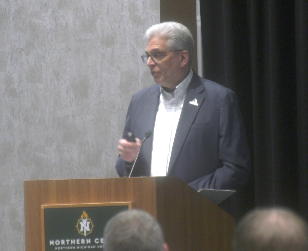Kingsford, Mich. (WZMQ) – The Caringhouse of Iron Mountain has two child teen advocates who are giving educational presentations inside school health classrooms to advocate for healthy relationships among teens. This outreach is part of a month-long advocacy program put into place along with Dickinson County Law Enforcement and school officials at Kingsford High School.
The programming was created for National Teen Dating Violence Awareness Month, but these advocates agree that they hope to teach healthy relationships to create lasting health and happiness for these young adults in the community.
Some of their objectives cover the lasting effects of abuse, teaching teens how to watch for cycles of abuse among their peers, and helping local teens to understand where to go if they seen signs of abuse, whether that be physical, emotional, or verbal.
Selene Gonzalez is the Child Teen Advocate at Caringhouse who covers services in both Michigan and Wisconsin, and she said that abuse isn’t just a big city issue.
“A lot of people might think that we don’t have this problem so much in our rural area, but statistics do say that one out of three teenagers has been in an abusive relationship, and I think a lot of the reason that we might not know is that only a third of them ever tell anybody before they’re an adult.” Gonzalez stated.
While the Caringhouse advocates for and supports healthy dynamics on a year-round basis for all ages, advocating for teens in this way is especially important to its staff.
Gonzalez said that a big part of talking about warning signs of abuse for teens versus adults is that teens can be a lot more isolated, and they don’t have the skills yet to get through those relationships. “They haven’t necessarily learned what they would prefer their boundaries to be, how to set their boundaries, and to see the red flags in the unhealthy relationships,” said Gonzalez.
The Caringhouse now has a second Child Teen Advocate to the program, Vanessa Bal. Both advocates agree they can cover a wider scope with their collaborative efforts. Bal said this is important because these teens are laying the foundations for their future relationships.
“For them to understand what healthy boundaries are, what warning signs are, and how to ask for help was really important to us, and to be able to support our community in that way,” Bal commented.
Bal wants teens to know that there is nothing that they could do to warrant any kind of abusive behaviors toward them, and she is spreading awareness to try to prevent potential heartbreaks and anxiety for these adolescents.
It’s not just heartbreak that teens in abusive relationships are at risk for. There are some serious lasting effects that these advocates are looking to prevent in the community through their advocacy efforts.
“That could be substance abuse to cope with the trauma, that could be living with PTSD or anxiety or depression…Risk for suicide is higher for somebody who has been in an abusive relationship especially in their adolescent years,” Gonzalez warned.
Bal said that some students may repeat cycles of abuse that they’ve seen their parents be in, and the advocates are there to let them know how healthy relationships are supposed to work.
Bal added that healthy behaviors get implemented at home, and through peers. So, it is important to her to make teens comfortable going to adults for help. She wants to help the teens feel safe and know that they are going to be believed if they run into problems that they don’t know how to face alone.
The Caringhouse advocates will be spreading awareness in the community throughout the rest of February, but they hope their impact will reach U.P. teens so that they understand how to seek help if they need it. All the Caringhouse’s services are free and confidential.
Anyone interested in learning more about the services that Caringhouse provides can visit caringhouseim.org








